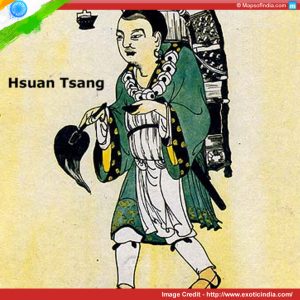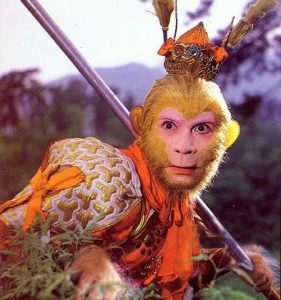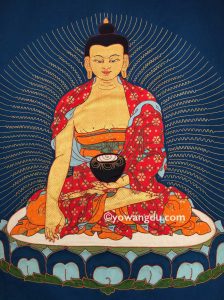 By Dick Mercer
By Dick Mercer
First published in 1582, The Journey to the West (Hsi-yu Chi) is one of the great classics of Chinese literature. The fantastic tale takes as its core the real sixteen-year pilgrimage of the monk Hsuang-tsang (596-664) to India to collect and bring back to China Mahayana Buddhist commentaries and sutras. Compiled and written most likely by Wu Ch’eng-en the 100 chapter novel comprises the adventures of the monk and his four animal disciples on their quest, a series of perilous adventures in which they overcome a variety of ogres, fiends, and monsters in dangerous and mysterious settings.
Throughout the story a question emerges–just who is the hero of this momentous journey, the monk Hsuan-tsang or his chief disciple Monkey? At the beginning of the novel Monkey is born from a stone egg; he bursts forth with great energy and is at once able to walk, run, leap about, and best of all enjoy life immensely. Quickly he becomes the handsome monkey king of all the other monkeys in a wonderful cave behind a waterfall, but before long he becomes sorely troubled by the realization someday he will die. He leaves his happy kingdom in search of immortality. After traveling across the ocean he enters the school of the Taoist master Subodhi who gives him secret instruction and so Monkey gains huge powers.
With these powers come ambition and achievement and recklessness; he becomes a kind of Taoist Frankenstein. Monkey ventures into the heavenly kingdom of the Jade Emperor where against all the rules he causes great disruption and even further adds to his potency, so much so that the heavenly ruler at the end of his rope can only call on the Buddha in India in hopes of controlling rebellious Monkey. When they meet, Monkey explains himself to Shakyamuni the Buddha:
Perfected in the many arts of ageless life,
I learned to change in ways boundless and vast.
Too narrow the space I found on that mortal earth;
I set my mind to live in the Green Jade Sky.
In Divine Mists Hall none should long reside,
For king may follow king in the reign of man.
If might is honor, let him yield to me.
Only he is hero who dares to fight and win!
This is Monkey’s grand declaration–his mission statement. The Buddha is unable to persuade Monkey of the wisdom that is self-control so he proposes a bet–just the sort of thing that would appeal to Monkey. If Monkey can jump out of the Buddha’s hand, he can become king of heaven, if not he must accept the consequences. Monkey gleefully takes the bet. In a justly famous comic episode he fails and the Buddha drops a mountain on him. The powerful, immortal “hero” is helpless under a immense mound of earth and stone.
 The story of Hsuan-tsang is very different. An orphan found floating in a basket down a river, he is taken in and raised as a Monk at Hung-Fu Buddhist temple in the imperial capital Ch’ang-an. As was the case with the Jade Emperor of heaven struggling with Monkey, the mortal Tang emperor is embroiled in troubles that literally take him to hell and back burdened with a heavy obligation to sponsor a grand religious ceremony. He selects Hsuan-tsang to celebrate these rites.
The story of Hsuan-tsang is very different. An orphan found floating in a basket down a river, he is taken in and raised as a Monk at Hung-Fu Buddhist temple in the imperial capital Ch’ang-an. As was the case with the Jade Emperor of heaven struggling with Monkey, the mortal Tang emperor is embroiled in troubles that literally take him to hell and back burdened with a heavy obligation to sponsor a grand religious ceremony. He selects Hsuan-tsang to celebrate these rites.
In the meantime the Buddha, returned to his distant home in India, decides things have come to such a pass that it is time to intervene. He dispatches the great Bodhisattva Kuan-Yin to China to select a pilgrim to travel to India for scriptures and then return to Ch’ang-an as a dharma messenger. On her way to China she encounters three monsters with super-powers being punished for misdeeds; if they will agree to join the quest they can gain their freedom. She makes the same bargain with Monkey under his mountain.
With dharma-quest set as the key to freedom for these incarcerated super-heroes, it remains for Kuan-Yin to select the essential human pilgrim to make the journey to the west. Without much difficulty she discovers Huang-tsang who agrees to set out for India in search of Mahayana scriptures. To mark the importance of the journey the Tang emperor gives the monk a new name–Tripitaka, the term used to designate the complete Buddhist cannon of monastic rules, sutras, and learned commentaries.
From the outset it is clear things will not be easy. On the first day Tripitaka’s two human companions are eaten up by monsters. Suddenly all alone, he is saved by an old hunter who guides him near to the border where they hear Monkey cry out, “the master has come.” Tripitaka releases Monkey from beneath the mountain and the two of them cross the frontier to begin their adventures in search of wisdom and liberation through the dharma.
Almost immediately they are surrounded by six robbers identified as eye, ear, nose, tongue, body, and mind. For Monkey who is used to fighting fearsome ogres and heavenly armies, these six (allegorical) banditti are not much of a challenge. He finishes them off in the blink of an eye, but to his dismay Tripitaka admonishes him. He should bring them to a magistrate, not kill them. Monkey loses his temper and storms off, leaving Tripitaka on his own again; this conflict between the human pilgrim and his rash, powerful disciple is played out again and again to the end of the novel.
Kuan-Yin, disguised as an old man, appears to the Monk and gives him a coat and a cap for Monkey, the means to control him. When Monkey cools off and comes back, Tripitaka convinces him to put them on. Monkey and Tripitaka are together again, but with a difference. Monkey’s new headgear can’t be removed and if he acts out, Tripitaka, using a little mantra, can cause the cap to shrink and Monkey to suffer a terrible headache. Pain replaces confinement as the bitter fruit of rashness and anger.
Tripitaka and Monkey now go on to form the complete dharma posse. This entails encountering the two dragons and the great pig who, like Monkey, have agreed with  Kuan-Yin to join the pilgrimage in exchange for freedom from bondage. It soon is obvious to the new members, however, that Monkey is by far the most powerful member of the group. In fact, Pigsy asks Monkey why doesn’t he simply carry them all to India in an instant and so avoid all the hard work and dangers that surely lie in front of them.
Kuan-Yin to join the pilgrimage in exchange for freedom from bondage. It soon is obvious to the new members, however, that Monkey is by far the most powerful member of the group. In fact, Pigsy asks Monkey why doesn’t he simply carry them all to India in an instant and so avoid all the hard work and dangers that surely lie in front of them.
Monkey says:
It is required of Master to go through all these strange territories
before he finds deliverance from the sea of sorrows. . . .
We cannot exempt him from these woes nor can we obtain the scriptures by ourselves.
The human component of the quest is just as important, if not more so, than the great powers of the four super-heroes who not only overcome great barriers and dangers, but who must help Tripitaka surmount his very real human weaknesses.
Shortly after Monkey emerges from under the mountain the two suffer a setback and Tripitaka for the first time–but not the last time–becomes confused and despondent. Monkey reacts with characteristic energy:
When (he) saw him crying, he was infuriated and began to shout:
Master, stop behaving like a namby-pamby! . . .
Bellowing like thunder he said, “You’re a weakling! Truly a weakling!”
Tripitaka may have the main goal of the quest in view, but it is Monkey, with regular, timely help from Kuan-Yin, who keeps the dharma posse on the road day to day, even in the face of petty and comical but potentially serious conflicts between the super-hero pilgrims themselves.
After many trials and close to their goal the pilgrims arrive on the bank of yet another river, this one over 20 leagues wide. Soon they are met by a man rowing a boat, but Tripitaka has very serious misgivings; the boat has no bottom. Seeing Tripitaka hesitate Monkey takes him by the scruff of neck and pushes him on board. The others join him on the gunwales, and they set off.
Suddenly they saw a body in the water, drifting rapidly downstream. Tripitaka stared at it in consternation. Monkey laughed.
‘Don’t be frightened Master,’ he said.
‘That’s you.’ And Pigsy said, ‘It’s you, it’s you.’
Sandy clapped his hands. ‘It’s you, it’s you,’ he cried.
The ferryman too joined in the chorus.
‘There you go!’ he cried. ‘My best congratulations.’
When they reach the other side, Tripitaka steps ashore with a strange feeling of lightness and exhilaration. Freed from the domination of the six senses–mortal flesh and bone–a fundamental spirit of mutual caring emerges. At this time he begins thanking each one of the dharma posse for helping him to reach his goal, but Monkey interrupts:
‘Every one of us,‘ said Monkey, ‘is equally indebted to the other.
‘If the Master had not received our vows and accepted us as his
disciples we should not have had the chance to do good works
and win salvation. If we had not protected the Master and mounted
guard over him, he would never have got rid of his mortal body.
Through a beautiful landscape they all set out for their meeting with the Buddha. After collecting the scriptures they have come for, they begin the return journey to China. Along the way, however, they experience several further crises that indicate theirs is an unending quest. The process is as important as the achievement, but there is a difference now. Monkey controls his temper, Pigsy is no longer a fool, Sandy attains perfect discretion, Horse is well able to see the point of a discussion; Tripitaka becomes the Buddha of Great Merit.
To be a hero patient cooperation and watchful self-control are essential. The Dhammapada, a very old collection of Buddhist proverbs, puts it this way:
Just as the farmer irrigates a field,
An arrowsmith fashions an arrow,
And a carpenter shapes a piece of wood,
So the sage tames himself.
At the very end of the novel when Monkey is named Buddha Victorious in Strife he asks Tripitaka why he must still wear the terrible little headache cap that he can’t take off. Tripitaka explains it was put on Monkey’s head when he was impossible to control, but now that he has become a buddha it is no longer needed. Monkey raises his hand to touch his head and indeed the migraine cap has vanished!
– – – – – – – – – – – – – – – – – – – –
This essay is Richard Mercer’s fourth analysis of heroism from the Buddhist perspective. His first essay focused on the Bodhisattva. Mercer has been a Visiting Instructor of English and Core (especially Edgar Allan Poe and Samuel Beckett) at the University of Richmond. He has studied Buddhism since the early 1990s. Only recently has he realized that the Bodhisattva ideal is a wonderful and practicable model to follow.